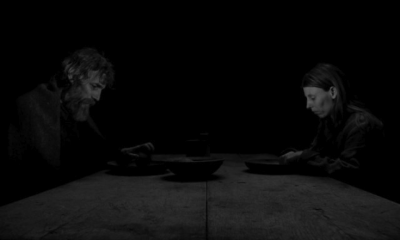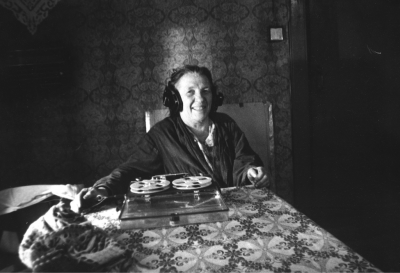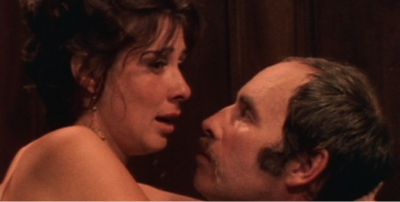These were not snapshots, but motion pictures – hence, “movies.” Or rather, they were “talkies” – sound happened too. And through editing there were unions and disunions of movement and sound, the building of story, of character. In the span of seven weeks I watched three.
Things we experience in close proximity in time come to bear on each other, bridge the gaps between them. Persons in close proximity attempt a similar bridging.
The first movie was a drama, imagined from the ground up. The other two were documentaries crafted from ongoing lives. Each brought a unique document of a couple-at-home to the screen in my home.
1
In Turin on the 3rd of January 1889, Friedrich Nietzsche encounters a cabman whipping his stubborn horse who has refused to move. He intervenes; he “throws his arms around the horse’s neck, sobbing.” A neighbor brings Nietzsche home where he lies in silence for several days until at last he speaks, “Mutter, ich bin dumm,” and lives for another ten years, “gentle and demented,” under the care of his mother and sisters. “Of the horse, we know nothing.”
A Torinói Ló, (The Turin Horse) opens with the above recounting, with the voice of the narrator against a black screen (but for the subtitles – meting out this prologue, line by line). Cut to horse and man making their way. The soundtrack takes over and for four minutes we watch these two accompanied only by music until at last we hear the horse, chains, and creak of the coach, moving forward.
“The First Day” finds the man, now walking, leading the horse as they arrive home to an inhospitable landscape. The wind whips violently. The man is met by a young woman. There is the house, there the well. There is the horse, put away in the stable. There, the wind and her hair.
Written by Béla Tarr and László Krasznahorkai, directed by Tarr and Ágnes Hranitzky, The Turin Horse is a 2011 Hungarian drama presented in black and white, covering 6 days in 154 minutes in a mere 30 long shots.
The film unfolds slowly, quietly, repeating, plodding, yet mesmerizing. The task of enduring relentlessly accompanied (or dragged onward) by the musical score, the wind, and the home sounds. After 21 minutes, the woman speaks (the first words since the introduction).
She: “It’s ready.”
There are potatoes and their fingers. They will not speak again for nearly ten minutes. It is then, at last, that we learn they are father and daughter.
She: “What’s it all about, Papa?“
He: “I don’t know.”
The horse, in a persistent , I,state of refusal, refuses (to work, to move, to eat), turns away.

Between the father and daughter an economy of spoken language prevails. Everything is done with purpose. Father (with lame arm) and daughter (boiling potatoes, hauling water) are defined not by familial affection but by reluctant resignation and perseverance in the midst of, in the face of, an unknown counter-force.
Visitors are foreign to the established equilibrium of home. When outsiders arrive, they bring with them a density of words, if only for a few minutes. One brings the news that “this change has indeed taken place.” Later, others leave the daughter a book, as payment for the water. She will read aloud, slowly.
Sound that occurs within the film’s story, in relation to and stemming from the subjects, setting, and/or actions is explainable: Open the door and the wind rages. Sound imposed by the filmmaker is omniscient and/or anarchic. It imposes a commentary via accompaniment. This film is in no way silent, but is permeated by an extra-aural quietness, punctuated by the internal sounds, and shaped by the application of music, narration.
I am implicated, attentively eavesdropping. As I enter their world, it overtakes mine. Every texture, each voice, every move, each sound; I watch and listen.
She helps her father dress again. Another meal, another try, tomorrow. The earth turns against them, the well dried up.
He: “We’re not staying here. Pack!”
We see them crest the hill. Then return. Who can say what’s on the other side. Perhaps leaving is worse than staying.
She: “What’s this darkness?”
Not even the lamps will stay lit, not even the embers. There’s another day. In an interview, Tarr will say, this is “the whole of life…this is the heaviest thing.”
2
Billy and Antoinette grapple. They are in the midst of what one might call “troubles,” chafing against their marriage and each other, against gendered roles and expectations, and weakness.
A Married Couple documents 96 minutes of one marriage in the late 1960s in Toronto, Canada: the lives of Billy and Antoinette Edwards, and their child Bogart, and their dog Merton. “[It] makes John Cassavetes’s Faceslook like early Doris Day. (Time)” We can’t resist –this is why we watch.
He: “I just want a few things in life: success, money, fame…Fame is one of them, more than anything else…”
She: “…I want men and women alike to say… ‘I just love her,’ like that…and the men, I want them to crave me.”
Just out of frame are director Allen King, cinematographer Richard Leiterman, the cameras, the lighting and sound crew. By allowing them in (to their home, marriage, lives, for nearly two months), Billy and Antoinette get to view themselves in some sort of audiovisual-experience echo. Is this a privilege or a curse?
In hindsight, in 2009, Antoinette will say it helped. It would not save their marriage, could not save Billy from being hit by a car and killed years later, after the divorce.
For now, it’s all about the film, all about Billy and Antoinette. The sound is naturalistic (their voices, their music) but for the intro/outro original score – it’s emotionally leading, identifying this as bittersweet drama.
There are: separate beds and bedrooms, fights and fights, dancing and imploring. There is actual shit on the floor.
There is want of: attention and affection, a harpsichord, grand piano, Moorish arches and mosaic tiles.
There is Billy: in red briefs, naked, in a shearling embroidered vest, an orange jumpsuit.
There is Antoinette: in black bra and pearls at the table, in apricot chiffon nightgown with jeweled collar, in white eyelet dress, vacuuming. There is Antoinette laughing.
Within this home, speech operates under rules specific to the house and its inhabitants, is a form of currency.
She: “No it’s not discussed, believe me, it’s not discussed, ’cause I’m gonna plan on it.”
There is the underlying understanding and the spoken supplement.
He: “…I don’t want your goddamned emotions spilling all over me in the morning.”
Speech surmounts that which is not yet understood or further messes a mess.
She: “Don’t touch me!”
He: “I’ll break your fuckin hand.”
Their voices fill the space. Their conversations drive the film. What is said entrenches or distorts existing relations. What is necessary? What is excessive? When I say, why do I say? And when do I listen? When do I give?
He: “I’m really bewildered.”
She: “I felt like there wasn’t anything to win, or lose, or prove…but what I really felt was that I was really sorry I said this morning that I love you…”
We get to watch. Viewing A Married Couple is my way of knowing either the Edwards or a story of the Edwards, as I understand it: my version of King’s version of them, what King calls “actuality drama.” I must depend on King’s constructed story, and the bits of the Edwards that I can grab and hold.
She: “I’d rather have a three room house that works than a nine room house that’s full of shit.”
We are always, I suppose, feeling our way towards a holistic sense of knowing, storytelling from what is said, from what we see.
He: “The laws of society are not the problem in this marriage; the problem is you and me.”
In a 2010 interview, Allan King will recall learning – years after the fact – that Antoinette’s tears stem from her sense of loss at the imminent departure of the film crew – her observers, constant companions.
In the end, perhaps Billy summarizes it best.
He: “What we don’t know is if we really hate one another or not.”
In the same interview, King says, “there is another question that some people raise: Are they acting? And it sort of begs the question, because even if they were acting, where did the stuff come from? You know, it’s like dreams. They are your dreams.”
3
Meet Michael Belov as he sits at the table. The dog on his lap licks his nose. He explains.
He: “If there’s snot in my nose she’ll lick it clean. Do you think she does it for no reason? What do you think? Because of my pretty blue eyes?”
Victor Kossakovsky’s documentary, Belovy (The Belovs), presents 58 minutes of the lives of sister and brother Anna and Michael (Mikhail) in 1993 in Russia. Released in 1994, shot in black and white, the movie introduces us to the siblings on their farm.
He: “This is my message to everyone: Leave each other in peace. Let human beings develop in a natural way.”
But I can’t; I’m trying to see my way in to another set of lives, another pair and another constructed story. They’ve been translated to film, made a story. I read their words, subtitled in English.
Meet the river and its banks: its wide span and close-up on open water. A woman’s voice, then an invisible chorus, singing. The countryside, overpass, the child running, fireworks.
Meet Anna as she pulls back a dusty windowpane. She’s talking to, and milking, the cow. Then she speaks to the camera.
She: “I’m here with my brother. Why bother filming us? We are just ordinary people. We just live here, where the river begins. There’s nothing special about us.”
They are not young. Anna has buried two husbands – punishment, she claims, for an earlier transgression.
She cries: “It changed my whole destiny. Now I’m suffering.”
She provides an ongoing song, in conversation with her surroundings. She tells herself the story. She is Granny to the cow she calls “daughter.” The dog too. She is savior of the threatened hedgehog. Anna works, shouts, cries tears into laughter and back again.
Michael’s voice intrudes. He is relentless. Or he is drunk. He has “the gifts of an orator.” He philosophizes, he berates, he rants at the window, to the cat, at his sister.
He: “The State is you and me.”
The Turin Horse presents a remote landscape of near-silence between father and daughter, but the Belovs space fills with their voices. Kossakovsky shows the two in conversation with and around each other. They opine and argue.
Fists bang on tables. When their brothers visit, they implore Anna and Michael not to shout so. Her voice rises. Cut to a serene image of a cloud-smattered sky. We are returned to the table briefly. Cut to a static backdrop of the family in portrait in younger days. Anna’s voice rises again, with Michael’s.
The brothers in a sauna thrash themselves with branches; they bathe in the river. Kossakovsky silences their voices and we hear instead a crooner singing, “the moon was yellow and the night was young.” The selection and imposition of music, sound, and voice shape the story.
She: “You foul stinking creature.”
Perhaps silence is awkward.
He: “Don’t you see, you have no understanding. So I must kill you.”
As we watch the water we hear them, shouting. Is that a submerged door I see? Cut back to the table and they continue.
Anna’s body obscures and then reveals the young boy (who is he?) seated at the corner of the table. Michael’s fist on table, hand raises bottle. The sound cuts out; Anna grabs the bottle and we watch the child. He watches as they continue fighting. In the silence he looks down, looks frightened.
The sound returns. Michael, snoring, literally falls off the bench; he is passed out cold in the corner. We see Anna wearing headphones listening to the recording of their voices, their record. She laughs (I remember Antoinette’s laughter) then begins crying. Laughs again.

This that she’s hearing, it could be the sound of the movie I’ve set myself before, or some excess material I’ll never hear. I can hear only the muffle of their voices escaping from her headphones. I can only fully hear what made the cut. She can hear everything. She takes off the headphones and walks away.
In these films, what is visible is often not heard and is never the whole of what was there. What is heard is often not seen. What is there: a solid document, a mutable foundation.
The construction of a document always frames a version: of lives, of creation. These movies are documentation + drama. Story is always constructed.
In each film, every image and sound orbits a twosome. The others – those beyond the pair – are periphery. Each character is exceedingly strong, but it is each pair that makes the document possible. What could be more basic/eternal than the story of two: father/daughter, husband/wife, brother/sister? A body defined in relation to another body, and the empty space between.
But what happens after: is there anything left? Do they continue on? I am left and we are left.
Anna rises to dance, she circles and stomps.
She sings: “…isn’t it cold in winter, dear? Are you, darling, happy here?”
Elizabeth Witte received her MFA in poetry from the Bennington Writing Seminars and is Assistant Editor of The Common.




